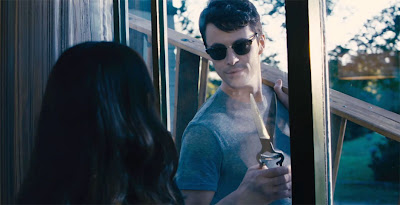Wednesday, 6 March 2013
Stoker (2013, Park Chan-wook)
I'm sure Alfred Hitchcock would have loved Oldboy; Park Chan-wook's 2003 mystery thriller complete with a Freudian sledgehammer finale, and by the looks of Stoker its director and screenwriter are surely endeared to him. This, however, is far from homage; yes the basic premise taken from Shadow of a Doubt is undeniable on paper and the precise visuals of Park certainly adds to the similar approach of Hitchcock, but this macabre tale of a young girl's adult awakening is entirely its own beast.
After the young Indian Stoker loses her father in a rather ambivalent car accident, her uncle Charlie - the uncle she'd never met - comes to stay with her and her 'grieving' mother. The enigmatic Charlie creates unease in India but arousal in her mother and as the highly mute and moody teen's growing concerns mount it's hard to gauge the objective weight of her emotions as film begins to take shape seemingly from within her mind. Charlie's presence is at once psychical and abstract, most memorably shown in a beautifully realised piano duet between uncle and niece with Charlie applying the lower, darker tones to the piece.
You'd be forgiven for thinking the film was going to be an exercise in horror, most notably the vampiric strand of the genre; with the title referring back to the Dracula author's surname and its director's previous film Thirst which dealt with vampirism by-way-of Catholic guilt, sin, and redemption. Though Stoker should deliver the kicks to any horror fan it is most notably a coming of age tale complete with all the angst, alienation and sexual provocation most commonly suited it. The film is a stunning example of filmmaking through and through, tinkering on the edge of genre and completing a full cycle of atmosphere and pace that's set up so early. It takes time to settle into the film's off centre take on just about everything it offers but manages to stay enthralling while keeping you at a distance, hinting more and more at its singularly bias take on the Jungian argument for nature verses nurture.
Park Chan-wook has always been an exciting innovator of aesthetics and with Stoker he and regular cinematographer Chung-hoon Chung create his most sumptuous visual feast to date. Not a frame is wasted here with interest present in every shot. Unforgettably vivid images are spread throughout and the radical approach to editing rivals even that of Nicholas Roeg's early work. And it all melds into one great dense narrative masterwork, intelligent by design with everything adding to a grande schema.
Nicole Kidman is perfectly cast as mother, Evelyn Stoker, with her strained kindness shown through a face which looks carved from ice or made of porcelain, she is both eerily sublime yet obscenely damaged. Matthew Goode gives a calm smoothness to Charlie while masterfully projecting an opaque evil that can't quite be held down, holding enough claim to his niece's unease. Mia Wasikowska has the hardest task of delivering the most from such a laconic character but does so well, the kind of performance so easily overlooked but is essentially the film's spine. But despite the perfectly pitched performances from a perfectly selected cast it's really Park Chan-wook who steals the show as without his overwhelming visually astute control it's hard to imagine the same material amounting to much in lesser hands, which is quite frankly most other directors.
Stoker is an audaciously obscure film that will entrance some and anger others. Its lurid and off centred nature throughout will be put many off but the inspired fluidity of direction and a typically powerful score by Clint Mansell are just a couple of reasons from another dozen to seek it out.
Labels:
2013,
film review,
Matthew Goode,
Mia Wasikowska,
Nicole Kidman,
Park Chan Wook,
Stoker
Subscribe to:
Post Comments (Atom)


No comments:
Post a Comment